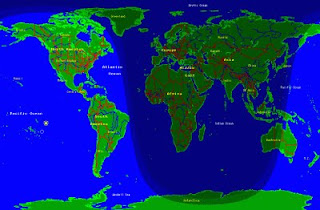Welcome to Teak Publishing's Shortwave Central blog. This blog covers shortwave frequency updates, loggings, free radio, international mediumwave, DX tips, clandestine radio, and late-breaking radio news. Visit my YouTube and Twitter links. Content on Shortwave Central is copyright © 2006-2026 by Teak Publishing, which is solely responsible for the content. All rights reserved. Redistribution of these pages in any format without permission is strictly prohibited.
Tuesday, January 15, 2019
Weekly Propagation Forecast Bulletins
Product: Weekly Highlights and Forecasts
:Issued: 2019 Jan 14 0403 UTC
# Prepared by the US Dept. of Commerce, NOAA, Space Weather Prediction Center
# Product description and SWPC web contact: www.swpc.noaa.gov/content/subscription-services
#
# Weekly Highlights and Forecasts
#
Highlights of Solar and Geomagnetic Activity 07 - 13 January 2019
Solar activity was very low. The solar disk was spotless during the reporting period. No Earth-directed CMEs were observed.
No proton events were observed at geosynchronous orbit.
The greater than 2 MeV electron flux at geosynchronous orbit reached high levels on 07-10 Jan and moderate levels on 11-13 Jan. The peak flux was 2,970 pfu observed at 07/2040 UTC.
Geomagnetic field activity ranged from quiet to active levels. Solar wind parameters began the period under waning negative polarity coronal hole high speed stream (CH HSS) effects. Solar wind speed began the period near 535 km/s, but diminished to near 345 km/s by 10/0720 UTC. Total field remained at 6 nT or less during this time. The geomagnetic field responded with quiet to unsettled levels on 07 Jan followed by quiet levels on 08-10 Jan. By late on 10 Jan, solar wind speed once again increased to near 515 km/s by 11/0435 UTC while total field only increased briefly to a maximum of 8 nT at 11/0635 UTC. The Bz component deflected southward for approximately 3 hours to near -6 nT. The geomagnetic field responded with an isolated active period on 11 Jan. By 12 and 13 Jan, solar wind speed had decreased to below 400 km/s. The geomagnetic field was once again quiet on 12-13 Jan.
Forecast of Solar and Geomagnetic Activity 14 January - 09 February 2019
Solar activity is expected to be at very low levels on 14-19 Jan and 03-09 Feb. A slight chance for C-class flares is expected on 20 Jan-02 Feb due to the return of old Region 2732 (N09, L=215).
No proton events are expected at geosynchronous orbit.
The greater than 2 MeV electron flux at geosynchronous orbit is expected to reach high levels on 25-27 Jan and 02-06 Feb due to recurrent CH HSS influence.
Geomagnetic field activity is expected to be at unsettled levels on 15-16 Jan. Unsettled to active levels are expected on 24-26 Jan and 31 Jan - 03 Feb with G1 (Minor) storm levels likely on 24 Jan due to recurrent CH HSS effects.
Product: 27-day Space Weather Outlook Table 27DO.txt
:Issued: 2019 Jan 14 0403 UTC
# Prepared by the US Dept. of Commerce, NOAA, Space Weather Prediction Center
# Product description and SWPC web contact: www.swpc.noaa.gov/content/subscription-services
#
# 27-day Space Weather Outlook Table
# Issued 2019-01-14
#
# UTC Radio Flux Planetary Largest
# Date 10.7 cm A Index Kp Index
2019 Jan 14 69 5 2
2019 Jan 15 69 8 3
2019 Jan 16 69 8 3
2019 Jan 17 69 5 2
2019 Jan 18 70 5 2
2019 Jan 19 70 5 2
2019 Jan 20 71 5 2
2019 Jan 21 71 5 2
2019 Jan 22 71 5 2
2019 Jan 23 71 5 2
2019 Jan 24 71 20 5
2019 Jan 25 71 12 4
2019 Jan 26 71 8 3
2019 Jan 27 71 5 2
2019 Jan 28 71 5 2
2019 Jan 29 71 5 2
2019 Jan 30 71 5 2
2019 Jan 31 71 10 3
2019 Feb 01 71 15 4
2019 Feb 02 70 12 4
2019 Feb 03 70 8 3
2019 Feb 04 70 5 2
2019 Feb 05 69 5 2
2019 Feb 06 69 5 2
2019 Feb 07 69 5 2
2019 Feb 08 69 5 2
2019 Feb 09 69 5 2
(NOAA)
